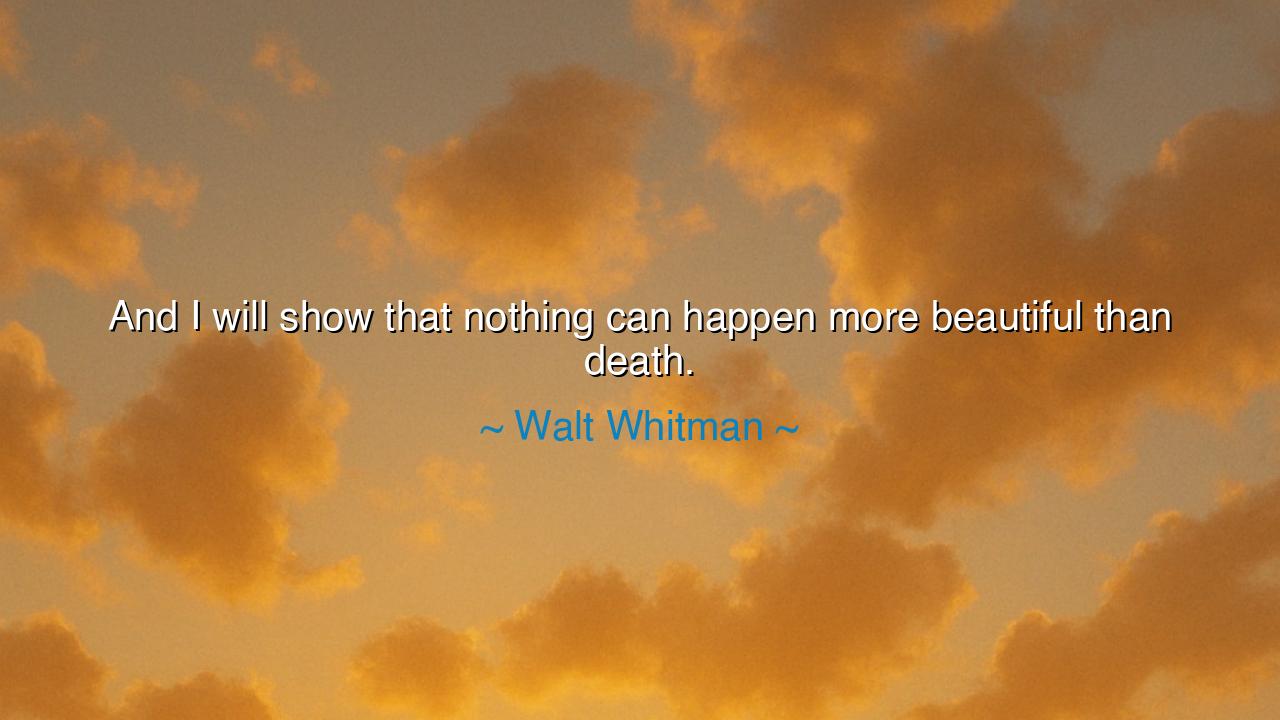
And I will show that nothing can happen more beautiful than






When Walt Whitman wrote, “And I will show that nothing can happen more beautiful than death,” he was not writing as one who worshiped sorrow, but as a poet who had looked beyond it. These words, born from his great work Leaves of Grass, do not glorify the end of life, but rather the continuation of life through transformation. To Whitman, death was not a fall into darkness, but a return to the eternal rhythm of the universe — the quiet and inevitable merging of the self with the infinite. In this way, he stood against the fear that rules so many hearts and proclaimed a new vision: that death is not the enemy of life, but its final harmony.
Whitman, the great bard of democracy and the human spirit, lived in a time shadowed by the American Civil War, a time when death filled the fields and cities with grief. Yet as he tended to wounded soldiers, as he walked among the dying, he did not turn away in despair. Instead, he saw in their passing a sacred mystery. He perceived how nature receives all things without judgment — how from decay comes rebirth, from endings come beginnings. The origin of this quote lies in Whitman’s spiritual vision of oneness, his belief that every life, every death, is part of a vast and beautiful design. To die, for him, was not to vanish, but to return to the great whole from which we came.
In his poetry, Whitman often spoke in the voice of nature itself, declaring that death is woven into the very fabric of beauty. The falling leaf, the setting sun, the ebbing tide — all are forms of death, and yet all are exquisite. If one can see beauty in these small endings, why not in the final one? The poet dares us to see that the fear of death is born of illusion — the illusion that we are separate from the world. But if we are made of the same dust that forms the stars, if we are bound by the same breath that moves through all living things, then death is not loss, but union. It is the moment when the soul exhales and the earth inhales, when being returns to being.
This truth can be found echoed across the ages. Consider the story of Socrates, who, facing execution, drank the cup of hemlock without trembling. To his followers, who wept in fear, he said that no man knows whether death is the greatest of all blessings. He believed that the soul, freed from the body, might at last see truth clearly. Whitman’s words sing the same tune in a modern key: that to fear death is to misunderstand life, for life itself depends on death to renew it. Every seed must die to become a tree, every dusk must fall for dawn to rise. Thus, beauty and death are inseparable, each completing the other in the grand design of existence.
Whitman’s vision is not morbid, but heroic. It challenges humanity to stand before mortality not with dread, but with reverence. He invites us to imagine death as a doorway, not a wall — an awakening into the greater life that flows through all forms. “I bequeath myself to the dirt,” he wrote elsewhere, “to grow from the grass I love.” He saw his own being dissolving into the green earth, the rivers, the wind — into the eternal song of creation. There is courage in such faith, for it demands that we surrender our clinging to the self and trust the wisdom of the cosmos. To see death as beautiful is to live without fear; to live without fear is to live fully.
In a world that flees from the thought of death, Whitman’s words are an act of spiritual defiance. They remind us that death gives life its urgency and its meaning. Without endings, there can be no beginnings; without loss, no love would be precious. The wise, therefore, do not deny death, but walk beside it as a teacher. To know that every moment might be the last is to cherish every breath, every face, every sunrise. Death is beautiful because it teaches us to live awake — to see the sacred in the ordinary, the eternal in the fleeting.
So, my child, take this lesson and keep it in your heart: do not shrink from death, but learn from it. Let the awareness of its certainty sharpen your purpose and soften your pride. Live so that when the end comes, it finds you not afraid, but grateful — grateful to have danced in the sunlight, to have tasted joy and sorrow alike, to have been part of this grand and passing miracle. For in truth, as Walt Whitman saw, there is nothing more beautiful than death — because it is not the extinguishing of life, but its completion, its return to eternity, where all beginnings are born again.






AAdministratorAdministrator
Welcome, honored guests. Please leave a comment, we will respond soon